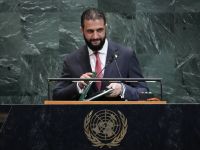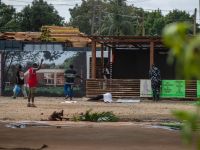By: Nida Ramahi
Hizbollah , the party of God, is back in the spotlight again after the capture of several Israeli soldiers in Shebaa following Palestinian-Israeli clashes. It has also been calling for Jihad to return all Palestinian occupied territories, and has said that it will support any country or group that will fight Israel.
With the frustration and growing anger among Palestinians and Arabs alike over the harsh response of the Israeli military to the Palestinian demonstrators, the stalemate in the Peace process and Israel’s continued failure to compromise on vital issues to the Palestinians, like Jerusalem, the refugees and boundaries, the role of Hizbollah is bound to remain strong with their call for continued resistance against occupation.
The recent meeting between Iran’s Foreign Minister Kamal Kharazi with Syria’s President Bashar Assad has also caused some apprehension about the renewed role that Hizbollah will play in the most recent disturbing events in the Middle East.
Although Hizbollah , which is considered by much of the International community to be a legitimate resistance movement, is the smallest in number of the Shiite Muslim groups, most analysts agree that it was the driving force behind the removal of the Israeli presence from Southern Lebanon. The loss of Israeli soldiers in an eighteen-year-old war of occupation, and the demands of a discontented Israeli public to leave Lebanon, led to Ehud Barak’s decision in May 2000 to withdraw from Southern Lebanon to Shebaa Farms, an area that Israel claims it occupied from Syria in 1967. Lebanon, however, claims sovereignty over Shebaa.
Since the withdrawal of Israeli troops, Hizbollah , like many of the other diverse groupings in Lebanon has taken more of a backburner role, focusing on its social services and getting into candidacy politics. That was, however, until the ambush of the Israeli soldiers and Ehud Barak’s stern threats that he will take military action against Syria and Lebanon.
Hizbollah wasn’t taken aback by this threat and insisted that the three soldiers won’t be released unless Israel releases nineteen of its members still held in Israeli jails. Hizbollah had requested that they be released during negotiations between Israel and Lebanon but was not successful in gaining it. .
Nor does it appear that Hizbollah is concerned by Israel’s threats, and their very vocal and public leader, the Secretary General of Hizbollah , Hassan Nassrallah had publicly said that it was a waste of time to negotiate with the Israelis and called for armed struggle against Israel. He urged the Palestinians to follow in the footsteps of his son who died in Lebanon two years ago in clashes with Israeli soldiers. He added that in order to establish the Palestinian state the armed struggle must continue.
But who is this group who has become an important and pivotal force in ME politics in general and Lebanon in particular ?
Hizbollah is believed to have taken its inspiration from the charismatic Imam Musa Sadr who disappeared in Libya in 1978. The modern day Amal movement arose from this early beginning. Hizbollah was believed to have branched off from Amal, and its birth came about as a result of the 1982 Israeli invasion of Lebanon. Prior to 1985, when the group was accused of kidnapping more than a dozen US marines stationed in Lebanon, Hizbollah was not known as well as the Hamas or Amal movements. Hizbollah ’s goal was first, to drive Israeli occupation forces out of Lebanon, and then to create an Islamic state in a country where politics were controlled by a Christian minority. In 1992, Sheikh Hassan Nassrallah replaced the more radical Sheikh Subhi Tufeli as Hizbollah ’s Secretary General
Although Nassarallah maintained the same policy towards removing Israel from territories it occupies, the policy of creating an Islamic state changed with Hizbollah , opting instead to become part of the existing political system. In a statement Hizbollah said “we don’t seek the application of Islam by force, but by peaceful political action……if Islam becomes the choice of the majority, then we will apply it, if not, we will continue to coexist and discuss till we reach correct beliefs.”
Hizbollah ’s main financial life support comes from Iran who throughout the Israeli-Lebanese war provided it with an annual budget of 150 million dollars. Its fighters were also trained by Iranian revolutionary guards in the Bekaa valley. Although the actual fighting force was numbered only in the hundreds, they were able to cause more damage to Israeli occupation than any other force in Lebanon.
According to many reports, there are several reasons for their successful operations against the Israelis. First, they executed their military action carefully. Secondly, they were supported by Syria who defended the groups campaign against the occupation and allowed Iranian military supplies to pass through its borders. Thirdly, although Hizbollah is Shiite, it was open to anyone who wanted to fight against Israel. Almost 40-50% of their fighting force consisted of Druze, Christians, Sunni Moslems, and members of other Shiite groups. Their success against Israel in 1993 and 1996 made them highly popular in the Lebanese community who wanted Israel out of Lebanon.
But as the deadline of Israel’s withdrawal approached, Israel, as well as much of the West, wanted to ensure that Hizbollah wouldn’t keep its weaponry. Hizbollah, however, was not willing to disarm as long as Israel maintained its presence in Shebaa farms. But Hizbollah was willing to modify its stand once Israel withdrew from Lebanon; the Deputy Chief of Hizbollah’s political bureau was quoted at the time as saying that “once the Israelis leave Lebanon, any further effort to drive Israel from Arab territory would be left to the Palestinians.”
Iran still provides more than sixty million US Dollars a year to Hizbollah, and has withdrawn its Revolutionary Guards. Now most of the aid provided goes to schools, hospitals and other social services in poor Shiite Muslim communities. This charitable network has created deep gratitude amongst the Shiite community.
Hizbollah though has maintained a lower profile since the withdrawal of Israel, that is until the most recent Palestinian-Israeli clashes. And Although Nassarallah had been vague about his position towards Israel, he’s been very firm about reaching a resolution to the issue of the Palestinian refugees.
In an interview with the Washington Post earlier this year, Nassrallah said that “any settlement that does not take into consideration the issue of the Palestinian refugees endangers the process and will prove to be a time bomb which can explode at any time. In regard to a peace agreement, Nassrallah has said that he opposed peace with Israel but added that if Lebanon, Syria and other Arab countries conclude agreement with Israel without settling the issue of the Palestinians in a just way, the future of the region would not be one of peace at all.
So without a solution considered just by the Palestinians, and with Syria and Israel still in dispute over the occupied Golan Heights, coupled with Israeli threats against Lebanon and Syria, topped with rising Arab anger and frustration, the role of Hizbollah and its sister groups will not recede and will remain popular against the region’s occupying force.
© 2000 Al Bawaba (www.albawaba.com)







